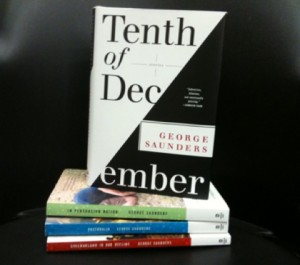 Here in 2013, American short-fiction author George Saunders is having a moment. His fourth collection of short stories, Tenth of December
Here in 2013, American short-fiction author George Saunders is having a moment. His fourth collection of short stories, Tenth of December, was published in January. Wikipedia describes the book’s critical reception as “mixed to positive” — but the positive end of that range seems remarkably intense: A recent New York Times Magazine interview with the author is titled “George Saunders Has Written the Best Book You’ll Read This Year.” (Bold title for an article published during the first week of January.) And on a winter Sunday after yet another nor’easter had finished slamming New England, Saunders’ Boston-area reading practically filled a local auditorium with his fans.
Saunders’ voice is mildly reedy, and when reading out loud he speaks quickly. This is not an optimal toolset for most types of public speaking. In fact I find it amazing how often writers struggle with handicaps when reading their work in public: poor voice projection, uncertain mannerisms, monotones. It’s a reminder, perhaps, that writers spend most of their productive time alone, or at least within their own heads.
(As an aside, British and Irish writers are a strong exception to this rule. They always seem to be projecting — as if they’ve spent years onstage training for the role of AUTHOR! Which maybe some of them have.)
But Saunders is nevertheless a highly enthusiastic public reader of his work. At Cambridge’s Brattle Theater, he amused the crowd by reciting different characters’ internal monologues in different voices. He made jokes. And he kept the whole thing short. He introduced himself with an anecdote in which he received the following advice from an older Polish gentleman, his driver at an earlier stop on the tour: “Don’t read too long.” So on Sunday afternoon Saunders read twenty minutes into his gripping short story “Victory Lap” — and then simply stopped, at a cliffhanger no less. He claimed that this was another part of his marketing strategy.
Then Saunders took questions from the audience. This is one self-promotional task that American authors seem quite skilled at, perhaps because so many of them have teaching experience. Saunders even went out of his way to encourage reluctant questioners, by describing a specific (“Darwinian”) phenomenon he had supposedly observed in each city: The individuals who posed the first questions at each reading…were always the ones most extravagantly blessed with sexual energy.
Saunders gave complete answers to all queries, even when they simply rehashed the same topics which writers are always quizzed about (and which are sometimes comprehensively covered in bookchatty articles like January’s New York Times rave). After explaining that you should never try to write fiction based on dreams, he admitted that his story “The Semplica-Girl Diaries” originated in a dream. He also briefly discussed his early work, confirming that he did indeed write the stories in his first book (CivilWarLand in Bad Decline) while working at his onetime day job as a technical writer.
(That answer was given in response to my question — which was the fourth one asked. So feel free to draw the appropriate conclusions about my own sexual energy.)
Since the venue for this reading was in Cambridge — in fact just a block from Harvard Square — it was inevitable that Saunders would be asked about David Foster Wallace. This question came next-to-last on the afternoon, from a long-haired young woman and probable graduate student who sat in the front row. (And speaking of extravagant sexual energy: Who can possibly compete with long-haired female grad students who sit in the front rows of literary events?) This query is fair game for Saunders: He teaches writing at Syracuse University, in the town where Wallace wrote much of his magnum opus, Infinite Jest. And Saunders was both closely acquainted with and often compared to Wallace. So on this afternoon Saunders generously shared his recollections of the late author of A Supposedly Fun Thing I’ll Never Do Again. But he was also careful to underline the two writers’ differences: Although Saunders and Wallace may have tended toward similar writing styles and themes, in Saunders’ view the two men approached those destinations from completely different directions.
I do think George Saunders has earned a place on the same literary team where David Foster Wallace was a longtime all-star. (Whose coach is probably Kurt Vonnegut. And whose general manager might be Thomas Pynchon.) Both writers share a distinct tone — deadpan absurdity — and an up-to-the-minute concern with the dehumanizing effects of capital and technology. But Saunders is by far the more approachable figure. He writes primarily short fiction and journalism: There is no daunting literary mountain, no Infinite Jest that one must conquer in order to grasp Saunders’ oeuvre. And Saunders’ father ran a pizza joint, instead of studying philosophy under one of Ludwig Wittgenstein’s most prominent American students.
The last question posed on Sunday afternoon was about the outpouring of acclaim that followed Tenth of December‘s publication. Saunders explained that for a while, his only exposure to this praise was via e-mails that started appearing in his inbox. Everything else at his house in the Catskills (this was probably during Syracuse University’s semester break) stayed the same. He also admitted that if he had received this good press ten years earlier, he might have reacted somewhat neurotically to it. But now Saunders’ philosophy was to treat this approval like an incredible cooking smell that one encounters wafting from a nearby house. You’d be an idiot if you didn’t linger for a few moments taking it in, he said. But you’d also be an idiot if you barged right into the house, looking for more.
Photo © 2013 by skahammer